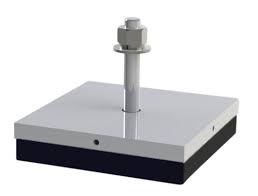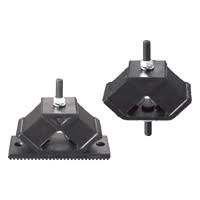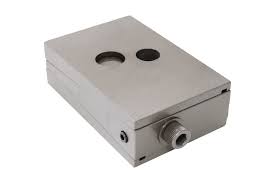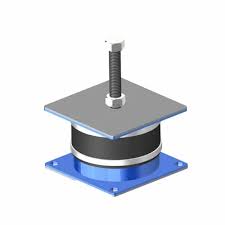HVAC Vibration Isolators play a crucial role in maximizing efficiency and performance in heating, ventilation, and air seismic isolated building conditioning (HVAC) systems. By effectively reducing vibrations and noise, these isolators not only contribute to a quieter and more comfortable indoor environment but also help to protect the system from unnecessary wear and tear. In this article, we will explore the numerous benefits of HVAC vibration isolators and how they can ultimately lead to significant improvements in energy efficiency and cost savings.
Maximizing Efficiency: The Benefits of HVAC Vibration Isolators HVAC vibration isolators are essential components in commercial and industrial HVAC systems. These isolators are designed to reduce vibration and noise, and they play a crucial role in maximizing the efficiency and longevity of HVAC equipment. By minimizing seismic isolators for buildings vibration, isolators help to prevent excessive wear and tear on HVAC components, including fans, motors, and compressors. This can lead to lower maintenance costs and fewer system failures, ultimately extending the lifespan of the equipment. In addition to reducing wear and tear, vibration isolators also help to improve overall system performance. By minimizing vibration, these isolators can help to maintain proper alignment of HVAC components, ensuring optimal operation and energy efficiency. Furthermore, reducing vibration and noise can also contribute to a more comfortable and productive working environment. By minimizing the disruptive effects of vibration and noise, isolators can help to create a more pleasant indoor environment for building occupants. In conclusion, HVAC vibration isolators offer a range of benefits, including lower maintenance costs, improved system performance, and a more comfortable indoor environment. By incorporating these isolators into HVAC systems, building owners and facility managers can maximize efficiency and ensure the long-term reliability of their HVAC equipment.
HVAC vibration isolators are crucial for reducing vibration and noise in commercial and industrial HVAC systems. By minimizing vibration, isolators prevent excessive wear and tear on HVAC components, such as fans, motors, and compressors. This ultimately reduces maintenance costs and extends the equipment's lifespan. Additionally, vibration isolators help to maintain proper alignment of HVAC components, leading to improved system performance and seismic isolation bearings energy efficiency. Furthermore, they contribute to a more comfortable and productive indoor environment by minimizing disruptive effects. Incorporating these isolators into HVAC systems ensures maximum efficiency and the long-term reliability of the equipment.
The Importance of HVAC Vibration Isolators in Commercial Buildings
vibration dampening mounts

HVAC vibration isolators are crucial components in commercial buildings as they help to reduce the transmission of noise and vibration from HVAC equipment to the building structure. This is essential for creating a comfortable and productive indoor environment for occupants, as excessive vibration and noise can lead to discomfort and distractions. Vibration isolators also help to prevent damage to HVAC equipment and building infrastructure by absorbing and dissipating the energy generated by the operation of HVAC systems. This can extend the lifespan of the equipment and reduce the need for costly repairs and maintenance. In addition, by reducing noise and vibration, HVAC vibration isolators can contribute to improved indoor air quality and energy efficiency. They can help minimize air leaks and improve ventilation system performance, resulting in better overall comfort and lower energy costs. Overall, the use of HVAC vibration isolators in commercial buildings is essential for maintaining a healthy, comfortable, and efficient indoor environment while also protecting the building and HVAC systems from excessive wear and tear.
Maximizing Efficiency with Proper HVAC Vibration Isolation technology

HVAC vibration isolation technology is designed to minimize the transmission of vibration and noise from HVAC equipment to the surrounding building structure. By implementing proper vibration isolation technology, HVAC systems can operate at maximum efficiency without causing unwanted disturbances. One key benefit of utilizing vibration isolation technology is the reduction of maintenance and repair costs. Vibration can cause wear and tear on HVAC equipment, leading to frequent breakdowns and the need for costly repairs. By effectively isolating vibration, the lifespan of the equipment is extended, and the need for maintenance is reduced. Additionally, proper vibration isolation can improve the overall performance of HVAC systems. When vibration is not properly managed, it can lead to decreased efficiency and increased energy consumption. With the use of vibration isolation technology, HVAC systems can operate at their optimal level, resulting in energy savings and lower operating costs. Another important aspect of vibration isolation technology is its impact on indoor air quality. Excessive vibration from HVAC equipment can lead to the release of particulates and contaminants into the air, negatively affecting indoor air quality. By effectively isolating vibration, the risk of this type of air pollution is minimized, creating a healthier indoor environment for building occupants. Overall, maximizing efficiency with proper HVAC vibration isolation technology is essential for maintaining the performance, cost-effectiveness, and indoor air quality of HVAC systems. Investing in high-quality vibration isolation solutions can lead to long-term benefits for both building owners and occupants.
Understanding the Role of HVAC Vibration Isolators in Noise Reduction

HVAC vibration isolators play a crucial role in noise reduction by minimizing the transmission of vibration and noise from HVAC equipment to the surrounding structure. By effectively isolating the equipment from the building structure, these isolators reduce the transmission of mechanical vibrations and airborne noise, thus contributing to a quieter and more comfortable indoor environment. Additionally, these isolators help to prevent the transmission of vibration-related issues such as equipment damage, structural fatigue, and occupant discomfort. Proper selection and installation of vibration isolators are essential for achieving optimal noise reduction and maintaining the overall performance of HVAC systems.
Choosing the Right HVAC Vibration Isolators for Your System

When choosing the right HVAC vibration isolators for your system, it's important to consider factors such as the size and weight of the equipment, the type of vibration it produces, and the environment in which it will be installed. Different isolators are designed to handle different levels and types of vibrations, so it's important to select ones that are appropriate for your specific application. Additionally, consider factors such as durability, maintenance requirements, and compatibility with the rest of your HVAC system when making your selection. It may be helpful to consult with a professional HVAC technician to ensure you choose the right isolators for your system.
Evaluating the Benefits of Upgrading to Advanced HVAC Vibration Isolators
Upgrading to advanced HVAC vibration isolators can bring several benefits to your system. These isolators can provide improved vibration control, reducing noise and extending the life of your HVAC equipment. They can also help prevent damage to surrounding structures and components. Additionally, advanced isolators can enhance the overall performance and efficiency of your HVAC system, resulting in energy savings and improved comfort. An evaluation of these potential benefits can help determine if an upgrade to advanced vibration isolators is a worthwhile investment for your specific HVAC setup.
The Impact of HVAC Vibration Isolators on System Lifespan
HVAC vibration isolators can have a significant impact on the lifespan of a system. These isolators are designed to reduce the transmission of vibration and noise from the HVAC equipment to the surrounding structure. By minimizing the effects of vibration, isolators can help to protect the system components and extend their operational lifespan. Excessive vibration can lead to premature wear and tear on system components, causing them to fail sooner than expected. This can result in increased maintenance costs and downtime, as well as the need for more frequent replacements. By using vibration isolators, HVAC systems can operate more smoothly and efficiently, which can help to reduce the overall wear and tear on the equipment. In addition to extending the lifespan of system components, vibration isolators can also help to improve the overall comfort and safety of a building. By reducing the transmission of noise and vibration, isolators can create a quieter and more comfortable environment for occupants. They can also help to protect the structural integrity of the building by minimizing the impact of vibration on the surrounding structure. Overall, the use of HVAC vibration isolators can have a positive impact on the lifespan of a system, as well as the comfort and safety of the building. By reducing the effects of vibration, isolators can help to protect system components and minimize the need for costly repairs and replacements.
Common Misconceptions About HVAC Vibration Isolators Debunked
Some common misconceptions about HVAC vibration isolators include the belief that they are not necessary for smaller HVAC systems, that they are only useful for reducing noise, and that they are not worth the investment. In reality, vibration isolators are essential for all HVAC systems, regardless of size, as they help to prevent damage from vibration and extend the lifespan of the equipment. Additionally, vibration isolators serve the important function of reducing noise and improving indoor air quality. While there is a cost associated with purchasing and installing vibration isolators, the long-term benefits in terms of energy efficiency and equipment longevity make them a worthwhile investment for any HVAC system.
Troubleshooting and Maintenance Tips for HVAC Vibration Isolators
When troubleshooting HVAC vibration isolators, it is important to first visually inspect the isolators for any signs of wear, damage, or misalignment. If any issues are found, the isolators should be replaced or realigned as necessary to ensure proper function. Regular maintenance of HVAC vibration isolators is essential to prevent issues such as excessive vibration and noise. This can include inspecting and cleaning the isolators regularly, as well as checking for any loose or damaged components. Additionally, it is important to ensure that the isolators are properly sized and installed for the specific HVAC system to effectively dampen any vibrations. If the isolators are not properly matched to the system, they may not provide adequate vibration isolation. Properly maintaining and troubleshooting HVAC vibration isolators can help to extend the lifespan of the equipment and ensure efficient and quiet operation. If in doubt, it is always best to consult a professional HVAC technician for assistance.
In conclusion, HVAC vibration isolators play a crucial role in maximizing the efficiency of heating, ventilation, and air conditioning systems. By effectively reducing the transmission of vibrations, these isolators not only improve the performance and lifespan of HVAC equipment but also contribute to a quieter and more comfortable environment. Investing in high-quality HVAC vibration isolators is essential for ensuring optimal system operation and minimizing potential maintenance costs in the long run. Therefore, it is clear that HVAC vibration isolators are a valuable asset for any HVAC system.
See also
https://www.vibrasystems.com/products/vibration-isolation/ https://www.armstrongfluidtechnology.com/en/products/hvac-system-components/vibration-isolators